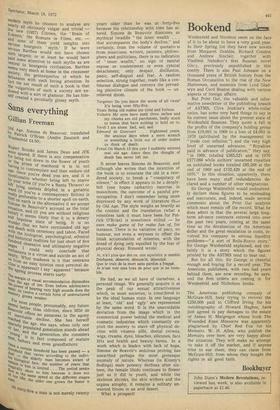Sans everything
Gillian Freeman
Old Age, Simone de Beauvoir, translated by Patrick O'Brian (Andre Deutsch and Weidenfeld £4.50).
Rupert Brooke and James Dean and JFK Were snared. If there is any compensation for being cut down in the flower of youth or the prime of manhood it is in not having to contemplate and then endure old age. Once you're dead you are, and it is Vestionable whether being left to starve 1Y Your tribe (if you're a Bantu Thonga) or eft lYing useless dripfed in a geriatric ward 1;!ally (if you're a contemporary Briton) is Preferable to a shorter spell on earth. on earth is the alternative if we accept si'Ncine de Beauvoir's account as the total b . 'ation, and (if you are without religious elief) it and ho seems likely that it is; a dreary Wonder peless state of being. It is no an that we have surrounded old age ,d death with ceremony and taboo. Faced and With the biological, psychological, ethnical hundred historical realities for just short of five nundred obsessive and ultimately negative Page s I could only conclude that• an sSia is a virtue and suicide an act of ot fro What madness is it that restrains tri an easy quietus once personal dethe• lle is apparent? I say ` apparent ' because ageing process starts early: The rna fro, rgin of visual accommodation diminishes the„,the age of ten. Even before adolescence s"a_.--wer of hearing very high sounds does the e. At of a certain form of unstructured vrnclrY grows weaker. seeF°r Most people, presumably, any future lna better than oblivion, since Mile de ofcatwoir offers no panaceas to the agony retinevitable decline. She has herself ,arhsei7coed the age, she says, when only one "_„ u,yto erj Populated generation stands ahead and the generation she considers 0 is in fact composed of mature , fathers and even grandfathers: °nee .., a certain threshold has been passed. —dva(1,4414/101d that varies according to the in t if his b. the elderly man becomes aware hot reola,lological fate; the number of years ears that to him is limited • . . The period seems t t flow aatRY short to him because it does n of he same speed at the different stage runosu. r life: the older one grows the faster it At —xtY-five a man is not merely twenty years older than he was at forty-five because his relationship with time has altered. Simone de Beauvoir dismisses as mythical twaddle "the inner wealth . . . that accompanies the body's decline," and certainly, from the volume of quotatio is from musicians, writers, painters, philosophers and politicians, there is no indication of "inner wealth," no sign of mental repose or contentment or even cynical detachment; only despair, disillusion, panic, self-disgust and fear. A random selection, strung together, reads like a continuous dialogue and conveys the pervading plaintive climate of the book — unrelieved doom.
Turgenev Do you know the worst of all vices? It's being over fifty-five. Yeats Being old makes me tired and furious. Voltaire My eyes have sunk three inches and my cheeks are old parchment, badly stuck to bones that have nothing to hold on to. Verdi I am alone. Sad, sad, sad.
Edmond de Goncourt . . frightened years, the anxious days when a mere scratch or something a' little out of order makes us think of death.
Freud On March 13 this year I suddenly entered real old age. Since then the thought of death has never left me.
It never leaves Simone de Beauvoir, and although she writes that the intention of the book is to reinstate the old in a reordered society, to break a "conspiracy of silence," in effect it appears to be a deeplyfelt (one hopes cathartic) exercise in masochism, the outcome of a painful preoccupation. I don't remember being more depressed by any work of literature th..n by Old Age. The style weighs as heavily as the content and the translation (what a relentless task it must have been for Patrick O'Brian) is sometimes stilted — he uses make game of for make fun of, for instance. There is no variation of pace, no humour, not even a wryness to offset the bleak accumulation of miseries, with the dread of dying only equalled by the fear of physical decay. Ronsard wrote: Jo, n'a'i plus que des os, une squelette je semble Decharne, denerve, demuscle, depoulpe.
Que le trait de la mort sans pardon a frappe.
Je n'ose voir mes bras de peur que je ne tremble.
He had, as we all have of ourselves, a personal image. We generally acquire it at the peak of our sexual attractiveness which, in most societies, is consilered to be the ideal human state. In one language at least, ' old ' and 'ugly' are represented by the same word. It is the unavoidable deviation from the image which is the commerical power behind the medical and cosmetic industries which constantly exploit the anxiety to stave off physical decline with vitamin pills, dental crowns, wigs, creams, dyes, bleaches, silicones, face lifts and health and beauty farms. In a work which is leaden with lack of hope, Simone de Beavoir's sedulous probing has unearthed perhaps the most grotesque anomaly of nature. Whereas (in Kinsey's findings) male potency declines after sixteen, the female libido continues to flower just as it did In youth, and while the skeleton shrinks, the skin withers and the organs atrophy, it remains a solitary unwanted bloom in an arid desert.
What a prospect!










































 Previous page
Previous page